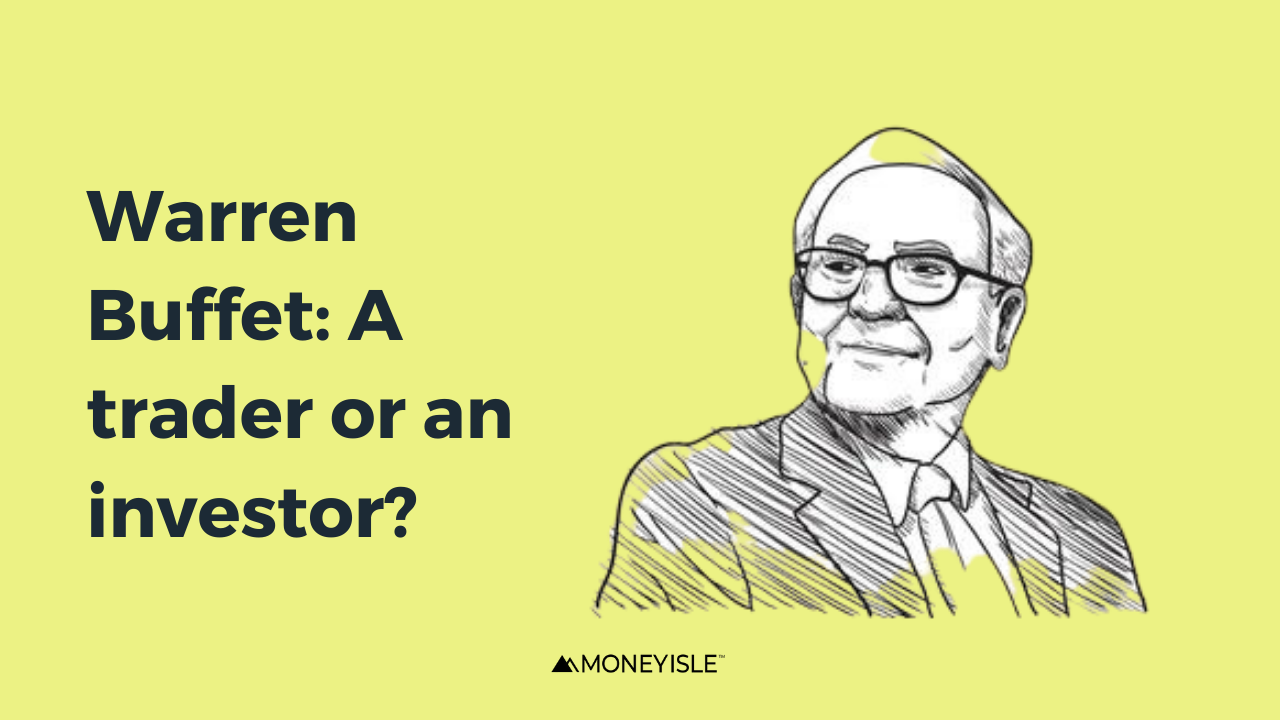At 13 years of age, Warren Buffett set his foot in the field of stock market. And ever since, he has been one of the pioneers of this industry.
Warren Buffett is one of the most widely renowned personalities and has been consistently ranked on Forbes’s billionaires’ list.
But does Warren Buffett do trading or investing? Is he a trader or an investor?
Warren Buffett is an investor and not a trader. He is someone who buys stocks in companies and then holds them for years to gain long term benefits.
Warren buffett has avoided wall street for the longest time. More than trading, Warren Buffett is inclined toward investing. And while he isn’t a trader, there are a lot of things that traders can learn from him.
What type of investor is Warren Buffett?
Warren Buffett is a value-based investor who invests in companies based purely on the basis that they have strong fundamentals, potential for continuous growth and a high earning potential.
Warren Buffett strongly recommends investing in yourself to become successful. This includes making the right financial choices and becoming aware and knowledgeable in the areas in which we are involved.
He invests in companies not for how they are performing in the market but by looking at the company as a whole.
He looks at the overall potential of the company and chooses his stocks purely based on the past performance and the future scope.
His main focus is on how well the company will be making revenue and profits in their business. He believes that the stocks that are currently undervalued will make their strong position in the market if they are quality stocks.
Buffet’s Methodology
So what goes on in the process to select the companies for investments? What type of investor is Warren Buffett? Let’s discuss this in brief.
Once Buffett looks at the undervalued stock, he goes through a set of questions that will help him in the decision-making. Also, remember that these are just a list of what goes into making the decision.
1. Company Performance
Warren Buffet’s investment strategy starts by looking at the ROI to check whether the company has performed better than the other companies in the same industry.
Return on Investment (or ROI) means the stockholder’s returns on investment. Investors should refer to the ROI of not just last year but the last 5-10 years as well. This will enable them to evaluate the historical analysis of the company.
2. Company Debt
The D/E ratio is calculated as follows:
Debt-to-Equity Ratio = Total Liabilities ÷ Shareholders’ Equity
Another important characteristic of Warren Buffett’s investment strategy is the debt to equity ratio (D/E).
It is important to know whether the debt is a small amount or large. This will help in the analysis to know if the earnings growth is generated from shareholders’ equity as opposed to borrowed money.
A higher D/E ratio means more debt than the equity financing the company. If the debts are higher, this will result in volatile earnings and huge interest expenses.
3. Profit Margins
Profit sales are dividing net income by net sales.
Good profit margins are not the only thing important, an increase in these profit margins is also a huge factor.
High profit margins mean that the company has been working well. Whereas increasing profit margins will mean the management is working efficiently.
You might feel that a good profit margin is a very high number, but to be precise most companies don’t make it higher than 20%.
This is because the operating costs are way too high. These costs include taxes, stores, salaries, offices, etc.
A profit margin of 10% is considered average, and anything that goes up to 20% is considered quite good. Once you cross 20%, anything higher than that is a win-win.
4. Is the Company Public?
Warren Buffett’s investment strategy gets applied by him only in areas that he understands. Therefore many tech companies don’t make their way into Buffett’s portfolio.
He mainly considers companies that have been around for more than 10 years. He invests in companies that have been passing the test of time but also is currently undervalued.
He mainly focuses on financial investing rather than technical analysis. Financial analysis helps the investors to check the historical performance of the company.
It is also true that past performance does not guarantee future performance but helps to determine how the company has been performing in the past and if it has proved itself to gain back its position in the market despite the volatility.
5. Is the company undervalued?
From all that you have read this far, you would have come to one strong conclusion – Warren Buffett went for stocks that were undervalued.
All the points that we went through are still easier to analyse. But how do you get to know that the stock’s current price is undervalued than its actual value?
This is the most crucial skill that Warren Buffett possesses. He finds companies that solve a problem more than anything. He then compares this value to the current market capitalization.
What are some other reasons for stocks to be undervalued in a market?
- The bad press that leads the stock price to fall due to economic, political, and social changes
- Sometimes the stocks don’t perform like they should have in an ideal situation and take a fall.
- Some stocks perform poorly only in particular quarters which also affects the stock price.
- Market crashes are one of the most common reasons for a stock to hit the ground.
Top Stocks that Warren Buffett has invested in
Every quarter Berkshire Hathaway, Buffett’s company discloses its current holdings to the shareholders. Its major investments are concentrated in only a few companies.
These 4 companies have about ⅔ value of the portfolio value:
- Apple (AAPL) – $159.1 billion
- Bank of America (BAC) – $42.6 billion
- American Express (AXP) – $28.4 billion
- Chevron (CVX) – $25.9 billion
You can observe a massive gap between the first and the second holding.
Buffett strongly believes in the tech giant, Apple and even describes it as “probably the best business I know in the world”.
He also calls it Berkshire Hathaway’s “third-largest business” after its fully owned insurance and railroad businesses. Bank of America stands out as Berkshire Hathaway’s second-largest position because Buffett has reduced the positions of most of his bank stocks in recent quarters.
Which stocks does Warren Buffett’s investment strategy avoid?
If you have gone through the list of Berkshire Hathaway’s stocks, you’ll find it doesn’t have a lot of technology-oriented companies.
This is mainly because Warren Buffet doesn’t invest in companies that he doesn’t fully understand. That doesn’t mean that the new tech-growing companies are not good businesses.
It’s just your understanding as to which businesses you understand the best. You can always invest by using Warren Buffett’s investment strategy by merely investing in the industries that you understand.
What to learn from Warren Buffett?
Should you just blindly start investing in stocks Warren Buffett has invested in?
Certainly not.
While it may be a good idea to keep a track of the stocks billionaire investors are investing in, it’s also important to learn from their strategies and analyse their investments.
This will help you create your investment strategies for the companies that suit the best for your risk tolerance and investment objectives.
Warren Buffett lives a very practical, down-to-earth attitude life just like his investing style. His investing style does have its critics but whether you support it or not, it reflects in his massive growth over the years.











